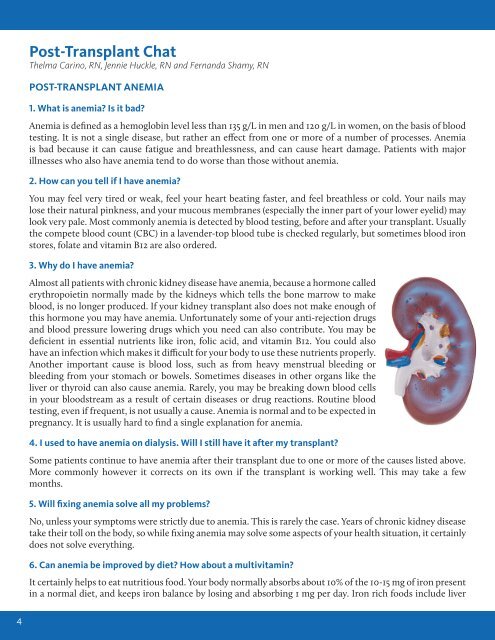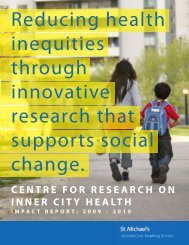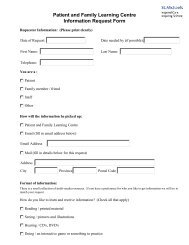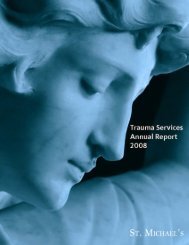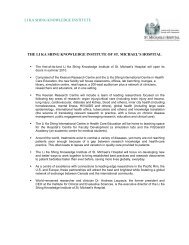Transplant Digest - Fall 2010, Issue No. 9 - St. Michael's Hospital
Transplant Digest - Fall 2010, Issue No. 9 - St. Michael's Hospital
Transplant Digest - Fall 2010, Issue No. 9 - St. Michael's Hospital
Create successful ePaper yourself
Turn your PDF publications into a flip-book with our unique Google optimized e-Paper software.
Post-<strong>Transplant</strong> Chat<br />
Thelma Carino, RN, Jennie Huckle, RN and Fernanda Shamy, RN<br />
POST-TRANSPLANT ANEMIA<br />
1. What is anemia Is it bad<br />
Anemia is defined as a hemoglobin level less than 135 g/L in men and 120 g/L in women, on the basis of blood<br />
testing. It is not a single disease, but rather an effect from one or more of a number of processes. Anemia<br />
is bad because it can cause fatigue and breathlessness, and can cause heart damage. Patients with major<br />
illnesses who also have anemia tend to do worse than those without anemia.<br />
2. How can you tell if I have anemia<br />
You may feel very tired or weak, feel your heart beating faster, and feel breathless or cold. Your nails may<br />
lose their natural pinkness, and your mucous membranes (especially the inner part of your lower eyelid) may<br />
look very pale. Most commonly anemia is detected by blood testing, before and after your transplant. Usually<br />
the compete blood count (CBC) in a lavender-top blood tube is checked regularly, but sometimes blood iron<br />
stores, folate and vitamin B12 are also ordered.<br />
3. Why do I have anemia<br />
Almost all patients with chronic kidney disease have anemia, because a hormone called<br />
erythropoietin normally made by the kidneys which tells the bone marrow to make<br />
blood, is no longer produced. If your kidney transplant also does not make enough of<br />
this hormone you may have anemia. Unfortunately some of your anti-rejection drugs<br />
and blood pressure lowering drugs which you need can also contribute. You may be<br />
deficient in essential nutrients like iron, folic acid, and vitamin B12. You could also<br />
have an infection which makes it difficult for your body to use these nutrients properly.<br />
Another important cause is blood loss, such as from heavy menstrual bleeding or<br />
bleeding from your stomach or bowels. Sometimes diseases in other organs like the<br />
liver or thyroid can also cause anemia. Rarely, you may be breaking down blood cells<br />
in your bloodstream as a result of certain diseases or drug reactions. Routine blood<br />
testing, even if frequent, is not usually a cause. Anemia is normal and to be expected in<br />
pregnancy. It is usually hard to find a single explanation for anemia.<br />
4. I used to have anemia on dialysis. Will I still have it after my transplant<br />
Some patients continue to have anemia after their transplant due to one or more of the causes listed above.<br />
More commonly however it corrects on its own if the transplant is working well. This may take a few<br />
months.<br />
5. Will fixing anemia solve all my problems<br />
<strong>No</strong>, unless your symptoms were strictly due to anemia. This is rarely the case. Years of chronic kidney disease<br />
take their toll on the body, so while fixing anemia may solve some aspects of your health situation, it certainly<br />
does not solve everything.<br />
6. Can anemia be improved by diet How about a multivitamin<br />
It certainly helps to eat nutritious food. Your body normally absorbs about 10% of the 10-15 mg of iron present<br />
in a normal diet, and keeps iron balance by losing and absorbing 1 mg per day. Iron rich foods include liver<br />
4


